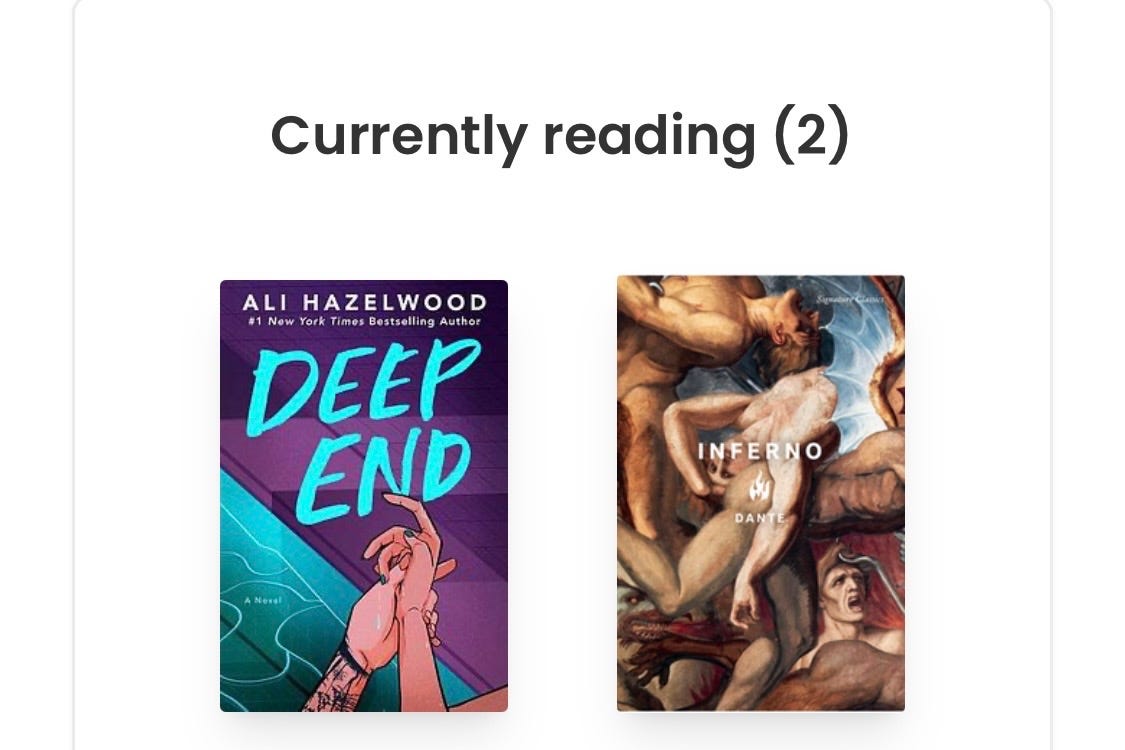Inferno - Dante Alighieri
This work is so influential that, despite being a product of Dante’s imagination, it is often mistaken for biblical canon and has shaped modern depictions of the afterlife. We follow the author as the poet Virgil leads him through the many circles of hell. Each location contains a unique punishment that mirrors the sins of its inhabitants. Dante interviews sinners on each level to better understand why they have been damned for eternity. Controversially, the poet depicts several popes as living in hell. This is a critique of corruption within the church’s hierarchy, as well as the prevalent practices of selling sacred items and accepting bribes to absolve people of their sins. I admire the boldness it took for Dante to write something so heretical, despite being a devout Catholic himself.
Dante’s imagery is metal AF. There are rivers of blood and pits of fire. The lower circles of hell are kept frozen in ice by the endless beating of Lucifer’s wings as he sits in a frozen lake. The devil’s three faces chew on Judas and the men responsible for the death of Julius Caesar as punishment for their treachery. It took me a while to get used to the older style of language but reading Inferno is a worthwhile endeavour, especially for anyone who finds religious history fascinating.
My favourite part of reading classic literature is that it deepens my understanding of modern art. The classics continue to inspire new generations and after reading one, I begin to notice its influence everywhere I look. For instance, I’ve always been a fan of Hozier and his “Unreal Unearth” album is a direct response to Inferno. Art has a special ability to allow for conversation across countries and over many centuries.
5 stars
Conspirituality - Derek Beres, Matthew Remski and Julian Walker
As a self-described hippie who loves meditation and herbal remedies, it’s important to me that I make a conscious effort to avoid the pseudoscience and alt-right views which often disguise themselves in spiritual spaces. This book contains essential knowledge for anyone who finds themself in a similar position. It breaks down the reasons the wellness movement has become highly compatible with conspiratorial thinking and the way this was exacerbated during the initial outbreak of COVID-19. It highlights key narratives to watch out for and explains the racist, misogynistic, eugenicist and medically incorrect ideals that conspiracy theories are based on. The authors maintain empathy for anyone who has been drawn into the world of misinformation in their effort to improve their lives or find spiritual community. My main critique is that some sections were overly dense and felt repetitive. The tone was rather depressing but this is to be expected when reading about the alt-right and anti-science pipeline.
3.75 stars
Bury Our Bones in the Midnight Soil - V.E. Schwarb
This book is about toxic lesbian vampires who torture and love each other across the span of five centuries. We follow three different points of view: a viscountess who struggles against the restrictions placed on women in 1532, a young girl entering the world of courtship in 1827 and a freshman at college in 2019. I’ve seen some people present the novel as a romance and it’s certainly not. The characters become romantically involved with each other but the relationships are based on manipulation, power imbalance and abuse. The central theme of this book is the trauma women have experienced and the way this is passed on through each generation. It also plays with the idea that women who prioritise their freedom are often viewed as monstrous. I did find myself getting bored at some points and not every scene felt necessary for the plot, but the ending was so heartbreaking that I thought about the book for days afterwards. This was my first V.E. Schwab book and it’s made me interested in reading more of her work. It felt more closely aligned with literary fiction than fantasy, so it would likely appeal to those who don’t typically like the paranormal genre.
4 stars




Deep End - Ali Hazelwood
Scarlett, our protagonist is an elite diver at Stanford who has become afraid of the sport she loves after a devastating injury. She’s an overachieving anxious perfectionist (relatable) and Lukas, our love interest is an Olympic swimmer who makes her feel safe enough to let go of control. They agree to keep their relationship casual but slowly begin to fall for each other. This is complicated by Scarlett’s close friendship with Lukas’s ex-girlfriend. The story is utterly delightful. If you’ve enjoyed Ali’s other books or you’re looking for romance then I recommend it. However, consensual power exchange is a significant part of the story and this won’t be to everyone’s taste so check the author’s note before deciding to read it.
3.75 stars
Half a Soul - Olivia Atwater
This is a skilful combination of a regency romance and a faerie story. It follows Theodora who has had half her soul stolen as the consequence of a magickal bargain. This has left her with dulled emotions and an inability to understand social protocol. People find her off-putting and she is unlikely to find a husband during the social season. Elias Wilder, the court magician, is intrigued by her condition and offers to help reunite her with her missing half. His eccentric and anti-social behaviour causes him to be disliked by the ton. Elias and Theodora’s growing connection causes quite the scandal. This was an adorable slow burn. I’m pleased that the novel portrays faeries in my favourite way, as immoral and powerful beings who fail to understand human emotion. Without spoiling anything, I liked the sentiment behind the ending. I’d recommend it for a light-hearted and relaxing reading experience.
3.5 stars
Thank you for reading
From Lucia xx





